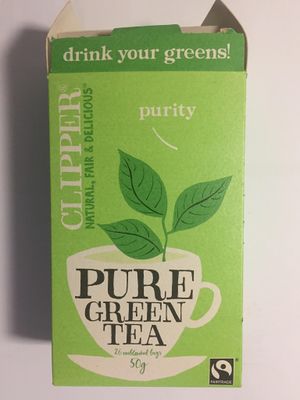Green tea
This article needs cleanup to meet MEpedia's guidelines. The reason given is: Contains information pasted from elsewhere, rephrase and add citations. (unknown date) |

Green tea is a type of tea that is made from Camellia sinensis leaves that have not undergone the same withering and oxidation process used to make oolong teas and black teas.
Some of the extracts of Green tea inhibit the activity of the Murine leukemia virus[1].
Green tea contains epigallocatechin gallate (EGCG) which is a strong antioxidant.
Evidence
There exists no evidence green tea is an effective treatment for ME/CFS in humans. A 2016 study claimed that green tea may improve some biological abnormalities in rats theorised to have ME/CFS. This study has not been reproduced.[2]
Potential Mechanism
Regular green tea is 99.9% water, provides 1 Calorie per 100 ml serving, is devoid of significant nutrient content (table) and contains phytochemicals, such as polyphenols and caffeine. Polyphenols found in green tea include epigallocatechin gallate (EGCG), epicatechin gallate, epicatechins and flavanols,[citation needed] which have antioxidant, anticarcinogen, anti-inflammatory, and anti-radiation biochemical effects in vitro. Other components include three kinds of flavonoids, known as kaempferol, quercetin, and myricetin.
Risks and side effects
In high doses green tea supplements can cause permanent liver damage in some people.[3] However, EGCG doses <800mg/day have not shown any hepatotoxic effects according to the European Food Safety Authority[4]
Costs and availability
It is nutritional supplement so its available without prescription. In Germany a 250mg capsule costs only about 0,14€ (approx. 0.17 US-$).
Research studies
- Therapeutic Effect and Metabolic Mechanism of A Selenium-Polysaccharide from Ziyang Green Tea on Chronic Fatigue Syndrome[2] - (Full text)
It is used in the treatment regime against ME of Ms Voss to prevent the use of Raltegravir
- My antiretroviral Regime for Antiretroviral Treatment of Myalgic Encephalomyelitis (Deutsch: #Arztanfragen - Mein Therapieregime für die antiretrovirale Behandlung bei Myalgischer Enzephalomyelitis)
- The health supplement that ruined my liver
Costs and availability
You can drink it as tea but green tea extracts is also available as supplements.
See also
Learn more
References
- ↑ Polyphenolic antioxidant (–)-epigallocatechin-3-gallate from green tea as a candidate anti-HIV agent
- ↑ 2.0 2.1 Shao, Changzhuan; Song, Jing; Zhao, Shanguang; Jiang, Hongke; Wang, Baoping; Chi, Aiping (November 15, 2018). "Therapeutic Effect and Metabolic Mechanism of A Selenium-Polysaccharide from Ziyang Green Tea on Chronic Fatigue Syndrome". Polymers. 10 (11): 1269. doi:10.3390/polym10111269. ISSN 2073-4360. PMID 30961194.
- ↑ "'The food supplement that ruined my liver'". BBC News. October 25, 2018. Retrieved October 25, 2018.
- ↑ Younes, Maged; Aggett, Peter; Aguilar, Fernando; Crebelli, Riccardo; Dusemund, Birgit; Filipič, Metka; Frutos, Maria Jose; Galtier, Pierre; Gott, David (2018). "Scientific opinion on the safety of green tea catechins". EFSA Journal. 16 (4): e05239. doi:10.2903/j.efsa.2018.5239. ISSN 1831-4732.

